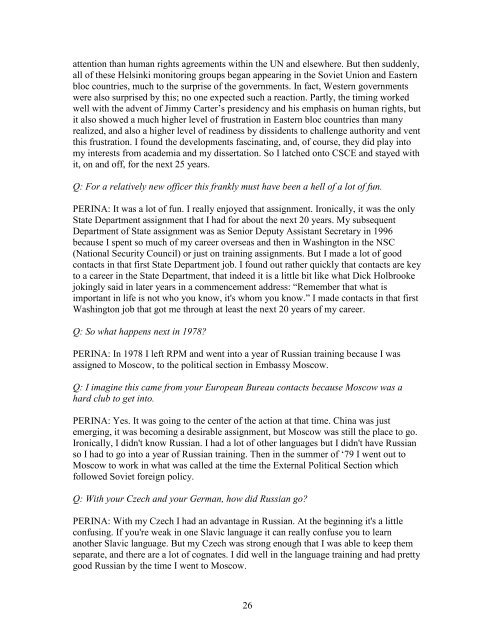ambassador rudolf v. perina - Association for Diplomatic Studies and ...
ambassador rudolf v. perina - Association for Diplomatic Studies and ...
ambassador rudolf v. perina - Association for Diplomatic Studies and ...
Create successful ePaper yourself
Turn your PDF publications into a flip-book with our unique Google optimized e-Paper software.
attention than human rights agreements within the UN <strong>and</strong> elsewhere. But then suddenly,<br />
all of these Helsinki monitoring groups began appearing in the Soviet Union <strong>and</strong> Eastern<br />
bloc countries, much to the surprise of the governments. In fact, Western governments<br />
were also surprised by this; no one expected such a reaction. Partly, the timing worked<br />
well with the advent of Jimmy Carter’s presidency <strong>and</strong> his emphasis on human rights, but<br />
it also showed a much higher level of frustration in Eastern bloc countries than many<br />
realized, <strong>and</strong> also a higher level of readiness by dissidents to challenge authority <strong>and</strong> vent<br />
this frustration. I found the developments fascinating, <strong>and</strong>, of course, they did play into<br />
my interests from academia <strong>and</strong> my dissertation. So I latched onto CSCE <strong>and</strong> stayed with<br />
it, on <strong>and</strong> off, <strong>for</strong> the next 25 years.<br />
Q: For a relatively new officer this frankly must have been a hell of a lot of fun.<br />
PERINA: It was a lot of fun. I really enjoyed that assignment. Ironically, it was the only<br />
State Department assignment that I had <strong>for</strong> about the next 20 years. My subsequent<br />
Department of State assignment was as Senior Deputy Assistant Secretary in 1996<br />
because I spent so much of my career overseas <strong>and</strong> then in Washington in the NSC<br />
(National Security Council) or just on training assignments. But I made a lot of good<br />
contacts in that first State Department job. I found out rather quickly that contacts are key<br />
to a career in the State Department, that indeed it is a little bit like what Dick Holbrooke<br />
jokingly said in later years in a commencement address: “Remember that what is<br />
important in life is not who you know, it's whom you know.” I made contacts in that first<br />
Washington job that got me through at least the next 20 years of my career.<br />
Q: So what happens next in 1978?<br />
PERINA: In 1978 I left RPM <strong>and</strong> went into a year of Russian training because I was<br />
assigned to Moscow, to the political section in Embassy Moscow.<br />
Q: I imagine this came from your European Bureau contacts because Moscow was a<br />
hard club to get into.<br />
PERINA: Yes. It was going to the center of the action at that time. China was just<br />
emerging, it was becoming a desirable assignment, but Moscow was still the place to go.<br />
Ironically, I didn't know Russian. I had a lot of other languages but I didn't have Russian<br />
so I had to go into a year of Russian training. Then in the summer of ‘79 I went out to<br />
Moscow to work in what was called at the time the External Political Section which<br />
followed Soviet <strong>for</strong>eign policy.<br />
Q: With your Czech <strong>and</strong> your German, how did Russian go?<br />
PERINA: With my Czech I had an advantage in Russian. At the beginning it's a little<br />
confusing. If you're weak in one Slavic language it can really confuse you to learn<br />
another Slavic language. But my Czech was strong enough that I was able to keep them<br />
separate, <strong>and</strong> there are a lot of cognates. I did well in the language training <strong>and</strong> had pretty<br />
good Russian by the time I went to Moscow.<br />
26
















